
Stachys the Apostle was the second bishop of Byzantium, from AD 38 to AD 54 according to tradition.

Stachys is a genus of plants, one of the largest in the mint family Lamiaceae. Estimates of the number of species vary from about 300, to about 450. Stachys is in the subfamily Lamioideae and its type species is Stachys sylvatica. The precise extent of the genus and its relationship to other genera in the subfamily are poorly known.
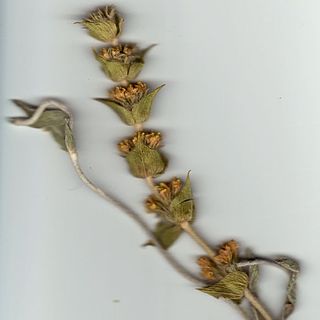
Sideritis, also known as ironwort, mountain tea, Greek tea and shepherd's tea, is a genus of flowering plants known for their use as herbal medicine, commonly as a herbal tea. They are abundant in Mediterranean regions, the Balkans, the Iberian Peninsula and Macaronesia, but can also be found in Central Europe and temperate Asia.
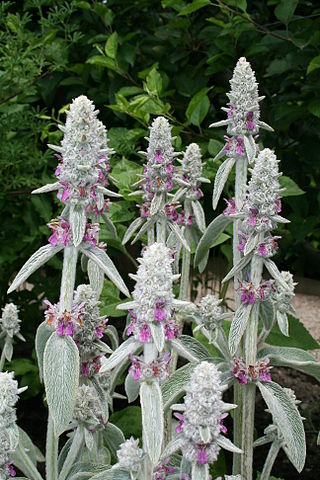
Stachys byzantina, the lamb's-ear or woolly hedgenettle, is a species of flowering plant in the mint family Lamiaceae, native to Armenia, Iran, and Turkey. It is cultivated throughout much of the temperate world as an ornamental plant, and is naturalised in some locations as an escapee from gardens. Plants are very often found under the synonym Stachys lanata or Stachys olympica.

Betonica officinalis, common name betony is a species of flowering plant in the mint family Lamiaceae, native to Europe, western Asia, and northern Africa. Other vernacular names include wood betony, common hedgenettle, purple betony, bishopwort, or bishop's wort.
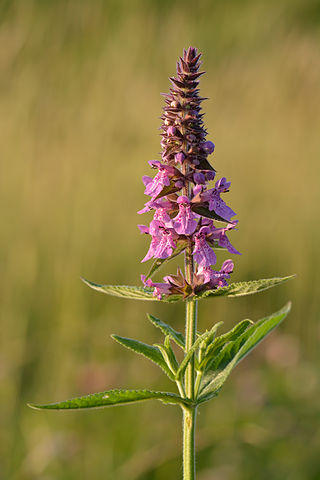
Stachys palustris, commonly known as marsh woundwort, marsh betony, clown's woundwort, clown's heal-all, marsh hedgenettle, or hedge-nettle, is an edible perennial grassland herb growing to 80 centimeters tall. It is native to parts of Eurasia but has been introduced to North America. The species epithet palustris is Latin for "of the marsh" and indicates its common habitat.
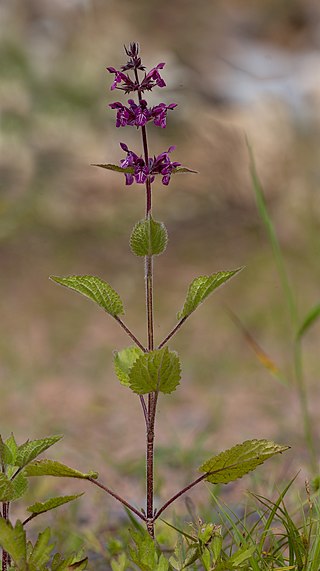
Stachys sylvatica, commonly known as hedge woundwort, whitespot, or sometimes as hedge nettle, is a perennial herbaceous plant growing to 80 cm (31 in) tall in woodland and unmanaged grassland. In temperate zones of the northern hemisphere it flowers in July and August. The flowers are purple. The leaves, when crushed or bruised, give off an unpleasant fetid smell.

Prachatice District is a district in the South Bohemian Region of the Czech Republic. Its capital is the town of Prachatice.

Sparganothis pilleriana, also known as the vine leafroller tortrix, is a moth of the family Tortricidae found in the Palearctic realm. It was first described by the Austrian lepidopterists Michael Denis and Ignaz Schiffermüller in 1775.

Celypha rufana, common name lakes marble, is a small moth species of the family Tortricidae, long known under the junior synonym C. rosaceana.

Stachy is a municipality and village in Prachatice District in the South Bohemian Region of the Czech Republic. It has about 1,100 inhabitants. The historic part of the village is protected by law as a village monument reservation. The local part of Chalupy is protected as a village monument zone.

Endothenia quadrimaculana is a moth of the family Tortricidae. It is found from northern and central Europe to Siberia and south-eastern Russia, Mongolia and China. Subspecies nubilana is found in North America.

Stachys recta, commonly known as stiff hedgenettle or perennial yellow-woundwort, is herbaceous perennial plant of the family Lamiaceae.
Alexey Nikolaievich Diakonoff, also transliterated as Alexej Nikolajewitsch Diakonoff, was a Russian–Dutch entomologist who specialised in Microlepidoptera.
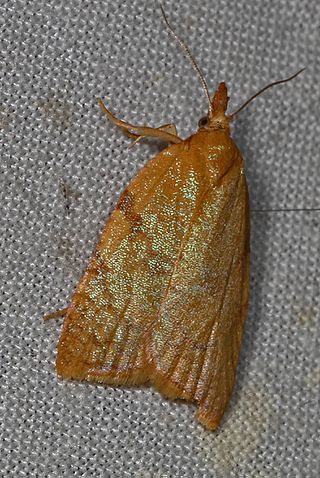
Sparganothis senecionana is a species of moth of the family Tortricidae. It is found in western North America, from British Columbia to Mexico and east to Colorado.

Endothenia pullana, the woundwort marble, is a moth of the family Tortricidae. It was described by Adrian Hardy Haworth in 1811. It is found in north-western Europe, Sweden, Finland, Austria, Slovakia, Ukraine, Belarus and Russia. The habitat consists of marshy areas.

Clepsis peritana, the garden tortrix or strawberry garden tortrix, is a species of moth of the family Tortricidae. It is found in Spain, Cuba, as well as North America, where it has been recorded from southern Canada throughout the United States.

Paramesia gnomana is a species of moth belonging to the family Tortricidae, first described by Carl Alexander Clerck in 1759.

Endothenia hebesana, the verbena bud moth, is a species of moth of the family Tortricidae. It is found in North America, where it has been recorded from Massachusetts, New York, New Jersey, Pennsylvania, Maryland, Virginia, North Carolina, Florida, Texas, Ohio, Indiana, Missouri, California, British Columbia, Alberta, Manitoba and Ontario. The habitat consists of black spruce-sphagnum bogs.

Endothenia ericetana is a species of moth, belonging to the family Tortricidae first described by Henry Noel Humphreys and John O. Westwood in 1845.



















